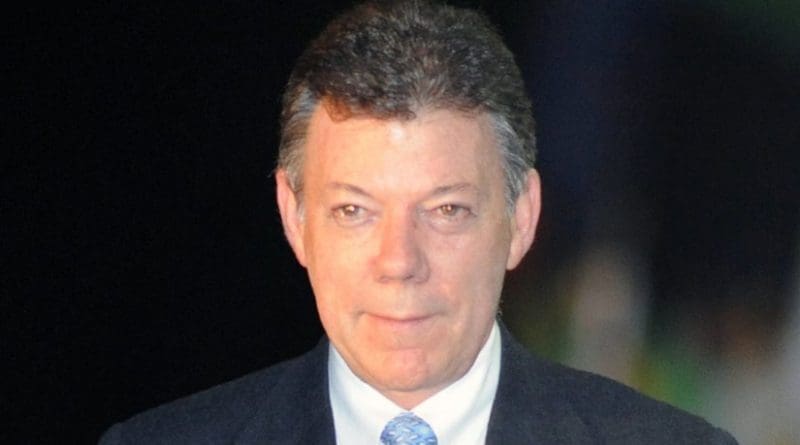WEF Awards Colombian President Santos Global Statesman Award
World Economic Forum Founder and Executive Chairman Klaus Schwab presented an exceptional Global Statesman Award to Juan Manuel Santos, President of Colombia and 2016 winner of the Nobel Peace Prize at the World Economic Forum Annual Meeting 2017 today. The award is given in recognition of Santos’ leadership and contribution to peace.
The peace settlement, culminating last November with signing of the agreement by guerrillas and the government, came after four years of negotiation. The peace dividend to be gained is clear. “With the end of the conflict, opportunities that open for Colombia are enormous: the country can begin to build roads, schools and hospitals,” Santos said. The agreement includes provisions for development in large tracts of the country that are fertile and can become productive.
Getting results quickly after a peace settlement is important, Santos emphasized. Colombians witnessed a “surreal” sight last weekend as television broadcasts showed scenes of guerrillas walking arm-in-arm down mountain slopes, leaving their camps. “This was not thought possible before,” the president said.
The president recounted emotional and harrowing moments throughout the six-year process of waging peace. When he might have felt discouraged, the victims of the conflict gave him spirit and energy, he said. Throughout the process, victims of Colombia’s 52-year civil conflict were the “pillar” of peace negotiations that culminated in a settlement last November, Santos said as he was given the award. “I thought they were going to be the toughest people to lead in the process; I found that, no, they are the best support,” Santos said.
“This is the first process where victims are at the centre of the solution, the negotiation – their rights to justice, reparations, the truth. Those are the pillars of the negotiation,” Santos said. The war left millions of victims in its wake – 300,000 Colombians were killed or injured, and 6 million were forced to leave their homes. Reparations are an essential element in the peace settlement, and compensation payments have already gone out to tens of thousands of people.
Another distinctive feature of the peace agreement is a set of special commitments to promote development in the zones of the conflict. “The unique aspects make the process a precedent for other conflicts that should be solved by negotiation,” Santos said.
He also admitted to learning from his errors. “Do not make a referendum when it’s not necessary,” Santos said with a laugh. The Colombian public rejected the settlement in a referendum last year. Revised terms were later passed by the Congress.
The Colombian peace process also took cues from negotiations in other countries that have brought successful conclusions to armed conflicts. “It was very creative, many people helped,” Santos said, citing South Africa and El Salvador. In South Africa, a Truth and Reconciliation process was set up after apartheid ended that allowed victims and perpetrators to tell their stories at public hearings; and in El Salvador, the government and guerrillas reached a peace agreement through negotiations in 1992.

